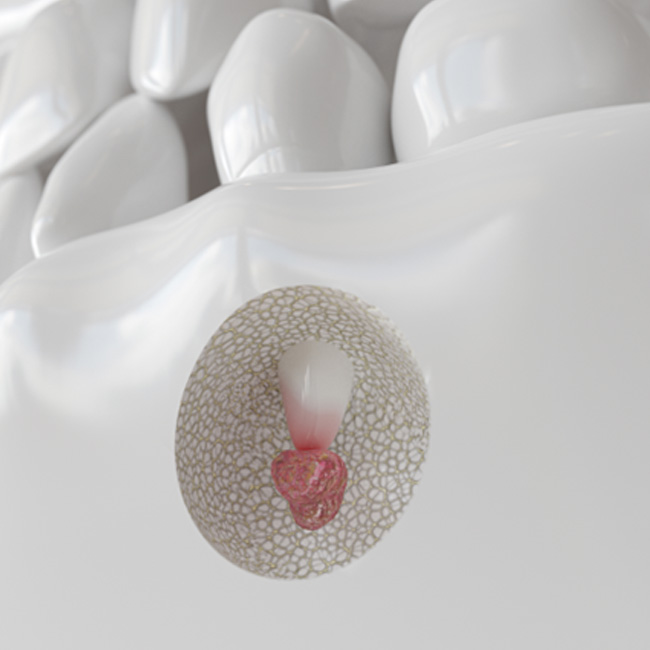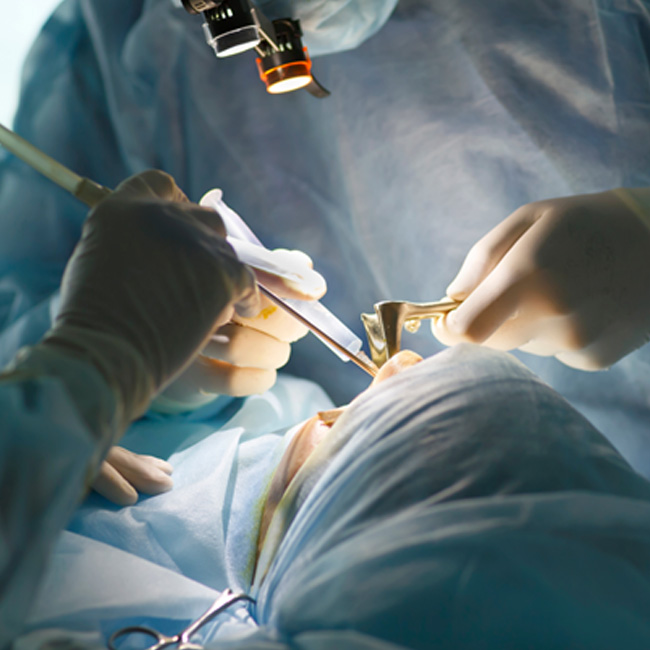Apicoectomy Katy
Preserve Your Tooth and Avoid an Extraction
Root canal therapy can be an effective way to save damaged and infected teeth, but it is not always 100% effective. Sadly, root canals can fail sometimes, leading to the need for additional treatment. Here at Piney Point Oral & Maxillofacial Surgery in Katy, we may be able to preserve your tooth via a surgery known as an apicoectomy. What is an apicoectomy, and why might you consider getting one? Continue reading below to find out, or contact our team directly to ask questions.
What Is an Apicoectomy?

An apicoectomy is a surgery that is sometimes performed when a tooth has a failing root canal or a large cyst around its root. An infection can spread beyond the tooth and start causing problems in the surrounding tissue.
To preserve your tooth and fight the infection, we may perform an apicoectomy. During the procedure, we carefully remove the root of the infected tooth and any nearby infected tissue. After the area is sealed, the tooth may be able to go on providing reliable function for many years.
Benefits of an Apicoectomy

An apicoectomy has several potential benefits:
- This surgery may be able to preserve your natural tooth and allow you to avoid the need for an extraction.
- You may experience relief from discomfort caused by infection or inflammation.
- The procedure can help stop the spread of infection to surrounding tissues, thereby protecting your oral and overall health.
- Your tooth could continue to function reliably for many years after the procedure.
- By avoiding extraction, you may prevent the need for more extensive and costly dental work, such as implants or bridges.
The Apicoectomy Process

After we determine that you need an apicoectomy, we carefully plan your treatment and then begin the procedure. First, we numb the area with a local anesthetic and may offer sedation to ensure your comfort. Then, we make a small incision in your gum tissue near the affected tooth to access the underlying bone and the root tip. We remove the infected tissue and the tip of the root, which eliminates the source of the infection and reduces the risk of it returning.
Next, we thoroughly clean the area and seal it with a biocompatible material to promote healing and protect your tooth. Once we finish, we suture your gum tissue back into place. We will give you detailed post-operative care instructions and schedule follow-up appointments to monitor your recovery.
What Happens After My Apicoectomy?

You can expect your mouth to be sore for a time after your apicoectomy. We will give you instructions to minimize discomfort during your recovery. For example, you may need to take pain medications and avoid foods that could irritate the surgical site. We may also prescribe some antibiotics for you; this can reduce the risk of another infection. Most patients are able to resume their normal routine within a few weeks of the procedure.
Apicoectomy FAQs
How Can I Tell if I Need an Apicoectomy?
We often recommend an apicoectomy when a standard root canal has not fully resolved infection or inflammation at the tip of a tooth’s root.
Some signs that you might need this procedure include:
- Persistent discomfort or swelling near a tooth that has already undergone root canal therapy,
- Recurring pain
- Extreme dental sensitivity
- A small bump on your gums
You should contact our practice if you experience any of these symptoms. Our team will conduct a thorough examination, including X-rays, to determine whether an apicoectomy is the most appropriate solution for your dental health.
How Long Does It Take to Recover from an Apicoectomy?
Recovery from an apicoectomy is generally straightforward, and most patients return to their usual activities within a few days, though it can take around 3 weeks for the soft tissue at the surgical site to heal. We typically advise resting for the first 24 hours and monitoring the area as it heals. Mild discomfort or swelling is normal, but these symptoms should gradually subside.
You can support your body’s recovery by following our post-operative instructions carefully. These may include:
- Avoiding strenuous activity
- Applying ice packs to reduce swelling
- Eating soft foods and avoiding the surgical area when brushing
- Taking prescribed medications as directed
If you run into any questions or concerns during your recovery, our Katy oral surgery team encourages you to reach out to us.
Does an Apicoectomy Come with Any Risks?
As with any surgical procedure, an apicoectomy carries some risks, but complications are rare when you follow our guidance and attend follow-up appointments. Possible risks include infection, bleeding, or damage to surrounding teeth or nerves.
We do everything in our power to minimize the risk that something will go wrong. For example, we will review your medical history and discuss all potential risks before your procedure. We also utilize advanced technology and techniques so we are able to be as precise as possible during the treatment.
What Do I Need to Do to Prepare for My Apicoectomy?
Preparing for an apicoectomy is simple, and we will provide you with clear instructions before your appointment. It is important to inform us of any medications you are taking and any other relevant health factors. On the day of your procedure, you should eat a light meal unless instructed otherwise and brush your teeth thoroughly.
To ensure the process goes smoothly, please:
- Wear comfortable, loose-fitting clothing
- Arrange for someone to drive you home if sedation is planned
- Follow any specific instructions we give regarding medications
Is an Apicoectomy Painful?
During the procedure, you can expect to feel little to no discomfort, as we use effective local anesthesia to numb the area. Sedation is also available when needed. Our team is gentle and attentive, and we will do everything we can to minimize discomfort.
After the anesthesia wears off, you may notice some soreness or swelling, which is typically manageable with the help of pain medications. If you experience any extreme or lingering pain, you should call us right away so we can determine the cause of the problem and take appropriate action.

